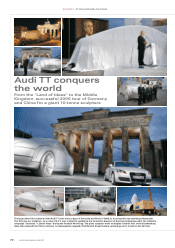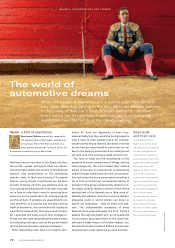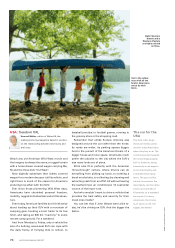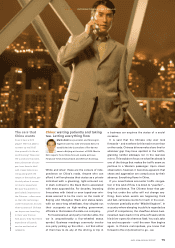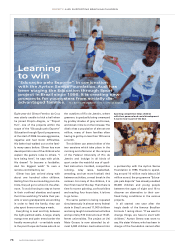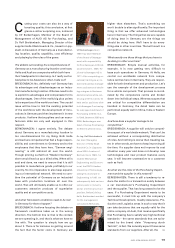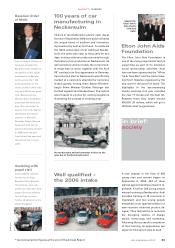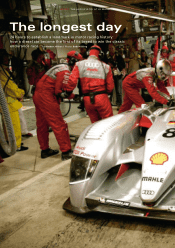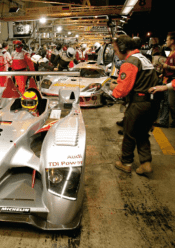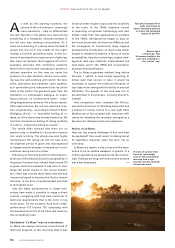Audi 2006 Annual Report Download - page 81
Download and view the complete annual report
Please find page 81 of the 2006 Audi annual report below. You can navigate through the pages in the report by either clicking on the pages listed below, or by using the keyword search tool below to find specific information within the annual report.
higher than elsewhere. That’s something we
won’t be able to alter significantly. The important
thing is that we offer advanced technologies
here in Germany. The things that we are capable
of doing best in Germany are the things we
should be doing here. We’ll have to do every-
thing else in other countries. That will result in a
competitive network.
What exactly are those things that you have to
be doing in other countries?
BREIDENBACH: Simple manual activities, for
example. It is now getting very difficult to
base such operations in Germany. At Hella, we
control our worldwide network from compe-
tence centres here in Germany. They are respon-
sible for both development and production. Let’s
use the example of the development process
for a vehicle component. That process is coordi-
nated by the competence centre and broken
down into individual steps. Whereas scopes that
are critical for competitive differentiation are
handled in Germany, the detail tasks can be
performed equally well in China, India or Eastern
Europe.
And how does a supplier manage to be
competitive?
BREIDENBACH: A supplier will only be competi-
tive as part of a worldwide network. That can’t be
achieved without a corresponding distribution
of roles. And nothing is worse than treading wa-
ter. In other words, we have to keep improving all
the time. If a supplier does not improve its cost
situation every year and does not develop new
technologies and new product features every
year, it will become unattractive to a customer
such as Audi.
So what are the roles of the Purchasing Depart-
ment and the supplier in this network?
BERKENHAGEN: There is still a tendency to re-
duce the matter to a transaction solely between
a car manufacturer’s Purchasing Department
and the supplier. That has long ceased to be the
case. If a Purchasing Department wants to be
successful, it must link up with the company’s
Technical Development, Quality Assurance, Pro-
duction and Logistics areas in such a way that it
can take decisions that are equally valid for the
entire company. At Audi, that means specifically
that Purchasing has to satisfy very high technical
standards – the same standards that are epito-
mised by the brand claim “Vorsprung durch
Technik”, in fact. We naturally expect those same
standards from our suppliers. After all, the >>
79AUDI 2006 ANNUAL REPORT
Cutting your costs can also be a way of
boosting quality: this conclusion, at first
glance a rather surprising one, is shared
by Ulf Berkenhagen, Member of the Board of
Management of AUDI AG for Purchasing, and
Dr. Rolf Breidenbach, Managing Director of the
supplier Hella KGaA Hueck & Co., based in Lipp-
stadt. A discussion of Germany as a manufactur-
ing location, quality capability, cost efficiency
and playing by the rules of the game.
The debate surrounding the competitiveness of
Germany as a manufacturing location continues.
Hella and Audi are companies which both have
their headquarters in Germany. Is it really such a
bad place to be based as is often made out?
BREIDENBACH: No, definitely not! Germany has
its advantages and disadvantages as an indus-
trial manufacturing location. What we need to do
is exploit its advantages and compensate for its
disadvantages. One of the really big plus points
is the expertise of the workforce here. The crucial
issue will be how to link the existing potential
of the workforce with the development of inno-
vations in Germany and then implement it in new
products. I believe that suppliers and car manu-
facturers alike are very well equipped in this
respect.
BERKENHAGEN: I agree entirely. The debate
about Germany as a manufacturing location is
too one-dimensional for my liking. Both Hella
and Audi are companies that feel a huge respon-
sibility and commitment to Germany and to the
employees that they have here. “German engi-
neering” is still admired all over the world.
Though pinning our faith on “Made in Germany”
alone would lead us up a blind alley. When all is
said and done, we need to ensure that it is still
possible to manufacture goods profitably in our
country. So it is imperative to also keep expand-
ing our international network. We need to com-
bine the potential of Germany as an industrial
base with production locations all over the
world. That will ultimately enable us to offer our
customers attractive products of superlative
quality and at competitive costs.
And what framework conditions need to be met
in Germany for that to happen?
BREIDENBACH: I believe focusing the debate on
framework conditions takes us in the wrong
direction. The bottom line is: that is the context
we are operating in, and that is what we have to
live with. The question is simply how we go
about it. There is for instance no getting around
the fact that the factor costs in Germany are
Ulf Berkenhagen (born
1961) has been Member
of the Board of Manage-
ment
with responsibility
for Purchasing at AUDI AG
since October 1, 2006. He
joined Volkswagen AG in
1977. After completing vo-
cational training as an in-
dustrial business manage-
ment assistant and obtain-
ing a degree in Business
Administration while con-
tinuing with his career, he
held senior positions with-
in Volkswagen Purchasing.
He was appointed Head of
Purchasing at SEAT, S.A.
in 1996. Between 2000 and
2006, Berkenhagen was
Head of Group Purchasing
for Electrics/Electronics.
Dr.-Ing. Rolf Breidenbach
has been Managing
Director of Hella KGaA
Hueck & Co. in Lippstadt
since 2004. A native of
Bochum (born 1963), he
studied Mechanical
Engineering and Econom-
ics at the RWTH Aachen
University of Technology,
taking his doctorate in
Engineering in 1991. He
subsequently held various
senior posts in industry
and at a technical service
provider. Before joining
Hella, Breidenbach worked
for the management
consultants McKinsey.



